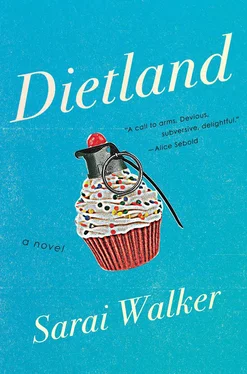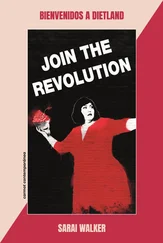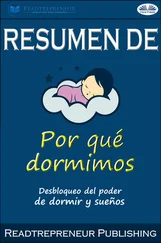I left the circular room, passing through the archway, walking briskly through the dark corridors to the front door of the underground apartment. I turned the handle and there was a click—the door swung open, revealing a tiny vestibule and the red door that led to the outside. I tried the handle of the red door and it opened. For the first time in days I felt sunshine and fresh air on my face. I snapped off the head of a rose that was dangling from a vine near the door and rubbed its petals against my cheek.
Shutting the door behind me, I walked up the steep concrete steps, which were warm beneath my bare feet. Outside there was no thrusting, no back-and-forth rhythm, and I steadied myself as I climbed. At the top I was awash in sunlight. The brightness of the sun burned through everything before me, and I saw nothing but shadows and shapes at first.
“Here she is,” said a voice. It took me a moment to recognize that it was Marlowe’s.
“She made it.” That was Sana.
“What took you so long?” asked Verena.
Through the sunlight they appeared before me, swathed in light. “I’m here now,” I said.
I had made my escape.
I’D BEEN LIVING ABOVEGROUND in Calliope House for more than a week, sleeping peacefully every night. Then the bomb threat came. I was awakened by pounding on the doors, which began with the front door downstairs and then spread throughout the house, far away at first but moving closer—an outbreak of thunder, an approaching storm.
My bedroom door opened and Sana’s face appeared through a strip of light. “Bomb threat,” she said, as if I knew what this meant. Before I could ask a question she was gone. I heard scurrying on the floors above and below me and rolled out of bed, then changed from my pajamas into my clothes. If there was a bomb, it might have exploded while I was wasting time putting on my bra and shoes.
The young policeman standing on the stoop as we trailed outside was probably wondering why so many women were living together in the same house, without any men. He held the door open and, once Verena was out, asked, “Is that it?”
We were cordoned at the end of the block with the rest of the neighbors. The clusters of red and blue police lights made our genteel street look like a disco, but we shuffled along slowly, barely awake. On Sixth Avenue, Verena claimed two benches. There were eight of us: Verena, me, Sana, Rubí, and four women who were staying as guests. We looked like we had fled a slumber party. There wasn’t much traffic at three a.m., but the cars that did pass slowed down to stare at us.
Sana yawned and set her head on my shoulder, resting her arm across my back. “Are you wearing a bra? ” she asked.
“I put it on before coming outside.”
“In the face of possible death by explosion, you put on a bra?” Rubí said.
“That’s not proper bomb threat etiquette,” Verena said.
“Ha ha.” I let them tease me. No one bothered to tell me what was happening and I assumed someone wanted to blow up Verena—an old disgruntled Baptist, perhaps, or someone else she’d angered with her rants against the diet industry. As I sat on a bench in the black hours of night, it made sense. But then a man in pajamas and leather slippers walked toward us. The pajamas were patterned with tiny cowboys lassoing tiny steers. He stepped over a passed-out homeless man, whom I hadn’t noticed. “We’ve got to do something about this,” the man said. “Do you like being woken up in the middle of the night?”
Verena looked up at the man. “I’m not going to help you throw out the Jews,” she said. She was marmoreal under the streetlight, in her white gown, with her light hair.
“This has nothing to do with the fact that they’re Jews, ” the man said. “Don’t say it that way.”
“If they weren’t Jews, terrorists wouldn’t be terrorizing them,” Verena replied.
The man waved his hand at her in disgust. “We’re going to act with or without you,” he said. “Don’t forget—if they go down, you go down.”
As the man stalked away, Verena explained that the Jews in question were our next-door neighbors, the Bessie Cantor Foundation for Peace and Understanding, a nonprofit organization that occupied the townhouse next to Calliope House, which was in fact attached to it. If they go down, you go down. For years the foundation had been the target of frequent bomb threats by unknown terrorists, who claimed that Bessie Cantor was a front for the Mossad. The businesses and residential neighbors wanted to evict the foundation from the block for all the trouble the bomb threats caused, for the evacuations and police presence and potential for mass casualties. Verena refused to take part in the growing campaign. “First the Jews, then us,” she said.
The man in the cowboy pajamas approached another group of neighbors, and it was clear they were talking about us. They stared and pointed at us, the women on the benches, as if on an island.
We were the outcasts.
At dawn, we were allowed back into the house. The other women returned to their beds, hoping to sleep for an hour or two, but I went directly to the kitchen. Since leaving the underground apartment and moving upstairs, I had spent most of my time in the red kitchen. Verena maintained a well-stocked pantry and in a frenzied few days I had worked my way through it, cooking and eating under the shadow of Eulayla Baptist’s fat jeans. I couldn’t remember when I’d spent such a happy, carefree time. I loved to bake most of all, making cakes and breads and fruit pies from scratch. Baking was restorative. I was soothed by the jeweled berries, the yellow of an egg yolk punctured with my fork, and I liked the texture, too, placing my hands in the soft flour, cutting into the white flesh of a bright green apple and feeling its juices on my fingers. After being underground, I now found an apple to be wholesome and pure.
I shared what I made with the other women but always kept enough back for myself. I could eat half a dozen cupcakes at once, followed by great gulps of cold milk. I could eat a peach pie in the afternoon with a pot of coffee and a can of whipped cream. No matter how much I ate, I didn’t feel full. In the past, after I binged, I’d rein myself in. I’d been doing that for years—diet-binge, diet-binge, the old two-step—but this was different. I never felt full, no matter how much I ate. It was as if the hunger from a decade of dieting was stored up inside me and the chains that had been wrapped around it were beginning to break.
That morning, while the other women slept, I made breakfast in the blue light at the back of the house. I put quiches in the oven and warmed the waffle iron. I hadn’t known about the bomb threats, but even with this new information, and the realization that we could all be blown to smithereens at any moment, I had never felt safer. Calliope House was filled with the scarred and the wounded, like me. Some scars were visible, some not.
Only a few of us actually lived in Calliope House. Each morning around nine a.m., the other women who worked with Verena arrived, filling the house with hivelike noise and energy. With me in the house, the kitchen became a gathering place, my homemade food devoured instead of the usual takeout and deliveries. The morning of the bomb threat was no different. I set out the quiches and piles of waffles, pitchers of orange juice. The smells filled the house like warm, fragrant breath. Soon I had company.
Rubí was the first to fill her plate. I had admitted to her that I’d ruined the poplin shirtdress she’d made for me during Marlowe’s makeover, but she said she still had the pattern and some of the fabric, if I decided I wanted another one. Sana was next in the breakfast line. When we first met, I didn’t know how to look at her, but I no longer saw a scarred face, just a face. This allowed me to notice her beauty, especially her eyes. They’d been spared any damage and were deep brown with a touch of gold, like two polished stones.
Читать дальше












